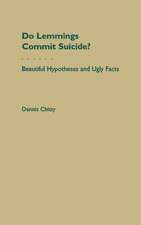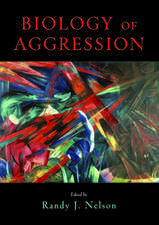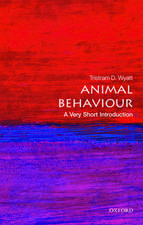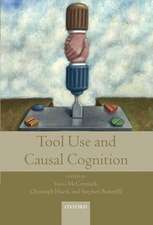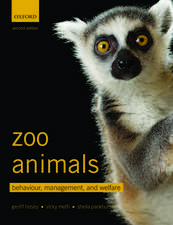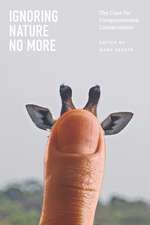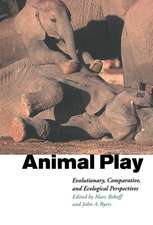Minding Animals: Awareness, Emotions, and Heart
Autor Marc Bekoffen Limba Engleză Hardback – 12 sep 2002
| Toate formatele și edițiile | Preț | Express |
|---|---|---|
| Paperback (1) | 128.47 lei 31-37 zile | |
| Oxford University Press – 5 iun 2003 | 128.47 lei 31-37 zile | |
| Hardback (1) | 266.57 lei 31-37 zile | |
| Oxford University Press – 12 sep 2002 | 266.57 lei 31-37 zile |
Preț: 266.57 lei
Preț vechi: 307.84 lei
-13% Nou
Puncte Express: 400
Preț estimativ în valută:
51.01€ • 52.94$ • 42.64£
51.01€ • 52.94$ • 42.64£
Carte tipărită la comandă
Livrare economică 04-10 martie
Preluare comenzi: 021 569.72.76
Specificații
ISBN-13: 9780195150773
ISBN-10: 0195150775
Pagini: 256
Ilustrații: 7 halftones, 1 figure and 1 line drawing
Dimensiuni: 244 x 163 x 24 mm
Greutate: 0.56 kg
Editura: Oxford University Press
Colecția OUP USA
Locul publicării:New York, United States
ISBN-10: 0195150775
Pagini: 256
Ilustrații: 7 halftones, 1 figure and 1 line drawing
Dimensiuni: 244 x 163 x 24 mm
Greutate: 0.56 kg
Editura: Oxford University Press
Colecția OUP USA
Locul publicării:New York, United States
Notă biografică
Marc Bekoff is Professor of Biology at the Unviersity of Colorado, Boulder, and is a fellow of the Animal Behavior Society and a former Guggenheim Fellow. He was recently awarded the Exemplar Award from the Animal Behavior Society for major long-term contributions to the field of animal behavior. Marc is also the regional coordinator for Jane Goodall's Roots & Shoots programme. He and Jane have recently co-founded the organization Ethologists for the Ethical Treatment of Animals: Citizens for Responsible Animal Behavior Studies (www.ethologicalethics.com). Marc is also on the Advisory Board for the conservation organization, SINAPU, and in part of the international programme, Science and the Spiritual Quest II.
Recenzii
In Minding Animals...Marc Bekoff observes and describes animals as individuals at play, dreaming and grooming, in a book with both brains and a heart.
To find out about the rich emotional life of nonhuman species, read Minding Animals.
Bekoff does a wonderful job showing the reader how learning and understanding and 'minding' animals and their behavior lead to recognition of their feelings as well. Using both his vast knowledge of animals and the observations made by other naturalists, Bekoff illustrates the minds, hearts, spirits and souls of the animal kingdom.
Interweaving anecdotal stories, discussions of scientific research, and explorations into the philosophy and theology of our relationship with nature and other animals, Bekoff builds a case for the necessity of understanding animals and granting them mutual respect as 'other persons.' The conversational writing style makes for a highly accessible book.
With this abundant narrative of Marc Bekoff a new age of intimacy between humans and animals has begun. The companionship, the play, the healing, the guidance, the protection provided by the animals, all these will be needed in the future as never before. Everyone should read Minding Animals, an amazingly thorough, delightful, and most important book.
For those of us who have immersed ourselves in the well being of life forms other than human, the fact that they communicate and have feelings is as natural and understandable as breathing. Through this lens we see clearly how their well being is intricately interconnected with our own. In Minding Animals Marc Bekoff has done a wonderful job of showing us how learning to understand and 'mind' animals and their behavior leads us to recognize their feelings as well. Through their layers, we find even more richness and joy of life as we glimpse into ever deeper parts of ourselves. This book is fun, inspiring, thought-provoking and educational! What a great mix!
Just as the best doctors attain detailed and compassionate knowledge of the uniqueness of each patient, so too do the best behavioral biologists
Except for relatively minor specializations that relate to whether we walk, run, fly or swim, all we vertebrate animals are physically stunningly similar. Most would also agree that the brain is an organ, as are stomachs, kidneys, and hearts, designed with functions and capacities useful for survival in often complex and indirect ways. There is no evidence, however, that what the brain does differs fundamentally across various species of vertebrates. Differences are in degree with respect to specific functions. In this readable, wide-ranging, and very stimulating book, Marc Bekoff takes this larger holistic view as a basis for a passionate exploration of how we should treat, and what we owe, our fellow-vertebrate creatures, who likely have many emotional and sensory survival mechanisms similar to our own.
Bekoff is an ethologist: a scientist who studies animal behavior. In this new look at the consciousness of animals, he shares his experiences along with the nitty-gritty details of how animal behaviorists make their living. But Bekoff goes beyond a mere description of the science of ethology. He also tackles bigger issues, such as the questions of animal cognition, intelligence, and their emotional lives. Bekoff has a talent for making his points by leading readers through the evidence for and against an issue and guiding them to a conclusion. Interweaving anecdotal stories, discussions of scientific research, and explorations into the philosophy and theology of our relationship with nature and other animals, Bekoff builds a case for the necessity of understanding animals and granting them mutual respect as 'other persons.' The conversational writing style makes for a highly accessible book.
To find out about the rich emotional life of nonhuman species, read Minding Animals.
Bekoff does a wonderful job showing the reader how learning and understanding and 'minding' animals and their behavior lead to recognition of their feelings as well. Using both his vast knowledge of animals and the observations made by other naturalists, Bekoff illustrates the minds, hearts, spirits and souls of the animal kingdom.
Interweaving anecdotal stories, discussions of scientific research, and explorations into the philosophy and theology of our relationship with nature and other animals, Bekoff builds a case for the necessity of understanding animals and granting them mutual respect as 'other persons.' The conversational writing style makes for a highly accessible book.
With this abundant narrative of Marc Bekoff a new age of intimacy between humans and animals has begun. The companionship, the play, the healing, the guidance, the protection provided by the animals, all these will be needed in the future as never before. Everyone should read Minding Animals, an amazingly thorough, delightful, and most important book.
For those of us who have immersed ourselves in the well being of life forms other than human, the fact that they communicate and have feelings is as natural and understandable as breathing. Through this lens we see clearly how their well being is intricately interconnected with our own. In Minding Animals Marc Bekoff has done a wonderful job of showing us how learning to understand and 'mind' animals and their behavior leads us to recognize their feelings as well. Through their layers, we find even more richness and joy of life as we glimpse into ever deeper parts of ourselves. This book is fun, inspiring, thought-provoking and educational! What a great mix!
Just as the best doctors attain detailed and compassionate knowledge of the uniqueness of each patient, so too do the best behavioral biologists
Except for relatively minor specializations that relate to whether we walk, run, fly or swim, all we vertebrate animals are physically stunningly similar. Most would also agree that the brain is an organ, as are stomachs, kidneys, and hearts, designed with functions and capacities useful for survival in often complex and indirect ways. There is no evidence, however, that what the brain does differs fundamentally across various species of vertebrates. Differences are in degree with respect to specific functions. In this readable, wide-ranging, and very stimulating book, Marc Bekoff takes this larger holistic view as a basis for a passionate exploration of how we should treat, and what we owe, our fellow-vertebrate creatures, who likely have many emotional and sensory survival mechanisms similar to our own.
Bekoff is an ethologist: a scientist who studies animal behavior. In this new look at the consciousness of animals, he shares his experiences along with the nitty-gritty details of how animal behaviorists make their living. But Bekoff goes beyond a mere description of the science of ethology. He also tackles bigger issues, such as the questions of animal cognition, intelligence, and their emotional lives. Bekoff has a talent for making his points by leading readers through the evidence for and against an issue and guiding them to a conclusion. Interweaving anecdotal stories, discussions of scientific research, and explorations into the philosophy and theology of our relationship with nature and other animals, Bekoff builds a case for the necessity of understanding animals and granting them mutual respect as 'other persons.' The conversational writing style makes for a highly accessible book.


